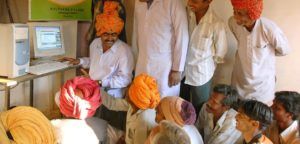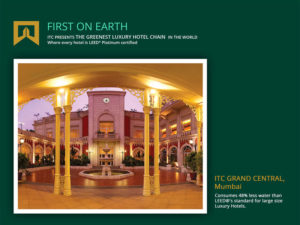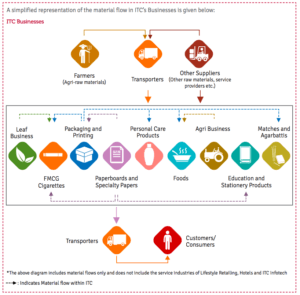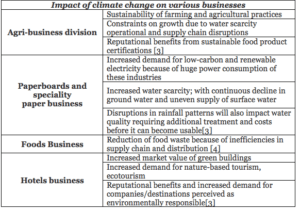ITC – an Indian conglomerate fighting climate change impact

How does climate change impact a packaged flour product? A cookie? Stationery products? Personal care products?. This post highlights how the entire value chain- from agriculture to retail can be impacted by climate change and how a vertically integrated conglomerate is fighting this.
Business Context
ITC is a diversified Indian conglomerate into FMCG, Hotels, Paperboards & Packaging, Agri-business and information technology. The company completed 100 years in 2010 and as of 2015-16, had an annual turnover of US $ 8 billion and a market capitalisation of US $45 billion. It employs over 25,000 people. [1]
As a conglomerate, ITC has a significant overlap between its different businesses, and different synergies among businesses give the company a competitive advantage. The flow chart below gives an idea of how different businesses link together-
For example, ITC’s packaged wheat flour/premium cookie business includes the following inputs from different businesses- Raw Materials (wheat) is sourced from farmers directly through the agri-business division, raw materials (packaging) is sourced internally from the paperboards and specialty paper business, the foods business owns the manufacturing facility, and the products are also retailed through ITC’s hotel chain. [2]
Climate change impact
Because of the intense overlap between these businesses (Agri-business, Paperboards and speciality paper business , Foods business & Hotels business), climate change affects a simple consumer product through different businesses in the following ways-
Action & Results
Agri-business division–
- ITC e-Choupal – an initiative to link directly with rural farmers via the Internet for procurement of agricultural and aquaculture products, was launched to enhance the ability of farmers to take informed decisions, align their farm output with market demand and ensures higher quality and productivity. [9]
- Drip irrigation was implemented in 700 hectares of land in the state of Andhra Pradesh , saving almost 900 million litres of water.[3]
- Launch of the ‘Soil conservation programme’ helped to provide inputs to farmers on sustainable agriculture techniques that address physical, chemical and biological health of the soil (covering around 7,000 hectares). [3]

Packaging and paperboards business –
- 51,21,855 tonnes of CO2 sequestered in this year, making ITC carbon positive for 11 years in a low [7]
- ITC started the Integrated Watershed Development Projects, covering 2,59,050 hectares of land , support the Water Positive status of the Company for the 14th year in a row.
- ITC’s social forestry programme covered nearly 64,795 hectares under pulpwood plantation and 22,879 hectares under energy plantation.[3]

Foods business –
- ITC’s WoW programme minimises scrap waste across the conglomerate. ‘WOW – Well-being out of Waste’ has provided effective solutions in several cities of South India. [8]
- ITC is planning a big investment in establishing a end to end cold chain to reduce agricultural waste [5]
Hotels business-
- ITC has secured the LEED platinum rating for all its hotels making it one of the greenest luxury hotel chain in the world. The rating means leadership in energy and environmental design for the highest standards of energy, water and waste efficiency. [6]
- Over 47% of ITC’s total energy requirements was met from carbon neutral sources such as biomass, wind and solar [6]

Way forward
In the long term, ITC should target using 100% renewable (produced by natural processes at a rate comparable to its rate of consumption) or recycled materials for products and packaging. ITC still uses many non-renewable materials (like those made from petroleum etc). Materials may come from traditional sources such as biomass , and ITC should use its R&D capabilities to understand how raw materials can be derived from biological processes. ITC’s vision should also be to have all waste end up in a valued waste stream (e.g., recycling, composting, waste-to-energy without toxic emissions). Finally, ITC must start committing to consumer education programs and encouraging audiences to be a part of the responsibility we all bear for protecting the environment.
[1] http://www.itcportal.com/sustainability/sustainability-report-2013/index.aspx
[2] http://www.itcportal.com/sustainability/sustainability-report-2013/material-sustainability.aspx
[3] http://itcportal.mobi/sustainability/sustainability-report-2016/default.aspx
[4] – https://www.theguardian.com/environment/2016/apr/07/reducing-food-waste-would-mitigate-climate-change-study-shows
[5]-http://economictimes.indiatimes.com/industry/cons-products/tobacco/itc-plans-multiple-projects-with-rs-25000-crore-outlay/articleshow/53335417.cms
[6] http://articles.economictimes.indiatimes.com/2011-07-19/news/29791004_1_itc-hotels-luxury-hotels-itc-properties
[7] https://sustainabledevelopment.un.org/partnership/?p=865
[8] http://www.itcportal.com/media-centre/press-releases-content.aspx?id=1135&type=C&news=itcs-wow-wealth-out-of-waste-initiative
[9] http://www.inclusive-business.org/2012/05/itc-e-choupal-india.html





You mention interesting points in the ways forward that ITC can manage for climate change’s impact. However, I think a key point that ITC will also need to account for is how its suppliers (specifically, farmers) will get impacted by climate change and what role ITC will need to play then, if at all it decides it wants to play a role. To elaborate, if temperatures rise, raw food grains will be produced at different parts of India than they currently are being produced, which will mean that farmers across the board will need to change sowing patterns or even the crop itself. In such a situation, ITC can choose to just go to different sets of farmers (who have the crop / supply they need) but do they have a responsibility towards their current supplier (the farmer) who is marginalized and fairly poor? I believe that ITC must proactively work with farmers and farmer support groups to educate them about what climate change may bring in terms of seasonal / precipitation variations and come up with ways to protect farmers’ incomes when things do start to go awry. Perhaps ITC can even be a leader and start a crop insurance / fixed price scheme? Only time will tell whether it focuses more on its bottomline or also towards its countrymen.
Rohit – Thanks for the interesting read! While, I was aware of the size and scale of the conglomerate, understanding the linkages between ITC’s various units has been fascinating. I echo Saurav’s opinion that as rainfall gets more erratic and soil quality continues to deteriorate, ITC will need to get more directly involved with the farmers, not only as a social responsibility but in order to protect their own supply chain. From what I understand, tobacco is ITC’s largest and most profitable business by far and I would love to know more about how climate change has impacted their raw material sourcing. An interesting mutually beneficial solution for ITC and the tobacco growers could be drawing on Hershey’s example of not only providing farmers with the education to improve productivity and withstand climatic variations but also promising to buy their produce at a premium. It will be very interesting to watch how ITC leverages global learnings to help combat the climate change threat from both a business and social standpoint.
Great post Rohit! I had an idea that ITC was working towards sustainability but it is amazing to see the extent of the focus and efforts made by them. Unlike most listed companies in India and other Emerging markets who have been touting and misusing the “Corporate Social Responsibility” card in India mostly for publicity and tax evasion purposes [1], ITC seems to be making a genuine effort towards sustainable growth. This is especially evident from the measures taken for energy conservation across ITC hotels and the sustainable agricultural practices that you specified.
The area where I still remain skeptical is their tobacco business. It is still the biggest source of revenue, forming around 45% of its US$ 8 billion revenues [2]. As per a WHO report [3], tobacco agriculture can have a serious detrimental effect on the environment. The uncontrolled use of chemicals may affect water sources and tobacco crops deplete soil nutrients by taking up more nitrogen, phosphorus and potassium than other major crops. Also, tobacco manufacturing produces non-recyclable and nicotine containing waste. All this is further compounded by the harmful effect of tobacco consumption on humans.
As compared to the efforts made by ITC in fixing the supply chain for its other products, it would be great to see similar efforts for their tobacco business.
[1] – http://economictimes.indiatimes.com/news/economy/finance/how-indian-companies-are-misusing-public-trusts-to-launder-their-csr-spending/articleshow/49474584.cms
[2] – http://www.itcportal.com/about-itc/shareholder-value/ITC-Corporate-Presentation.pdf
[3] – http://www.who.int/bulletin/volumes/93/12/15-152744/en/
Thanks Rohit, for the interesting post! We’ve been focusing many of our discussions on Western companies operating in emerging markets, so it’s refreshing to read about an Indian company in the Indian market. I agree with you that ITC’s vision should be to have all waste end up in a ‘valued waste stream’, but to the extent that these activities (e.g. recycling, composting, etc) are additional costs and investments that ITC needs to undertake, I’m curious to know who you think should bear these costs. If they are passed onto the consumer, how price sensitive do you think they are, and how easily will they switch to a competitor product that is cheaper? Would ITC be able to internalize these costs? Should the government play a role here, and help offset some of these costs?
Very interesting post, Rohit! I echo everyone’s comments – it is very refreshing to see an emerging market conglomerate strive to make a real difference in addressing climate change. I read an article a while ago that emerging markets are outpacing the G7 nations in tackling climate change and I was very skeptical but ITC seems to be a great example of a company that has made great strides. [1]
That being said, as Shray pointed out, frequently companies in emerging markets use environmental policies as a PR technique and I have definitely seen many companies in Bulgaria do that. So I was wondering – how does ITC measure the progress that is makes towards the various environmental initiatives you laid out in your post? Are there clear targets and metrics that the company uses to stay accountable?
[1] Pilita Clark, “Emerging economies outpace G7 on tackling climate change”, FT, September 2014, https://www.ft.com/content/9bec7772-34e6-11e4-ba5d-00144feabdc0, accessed November 2016.